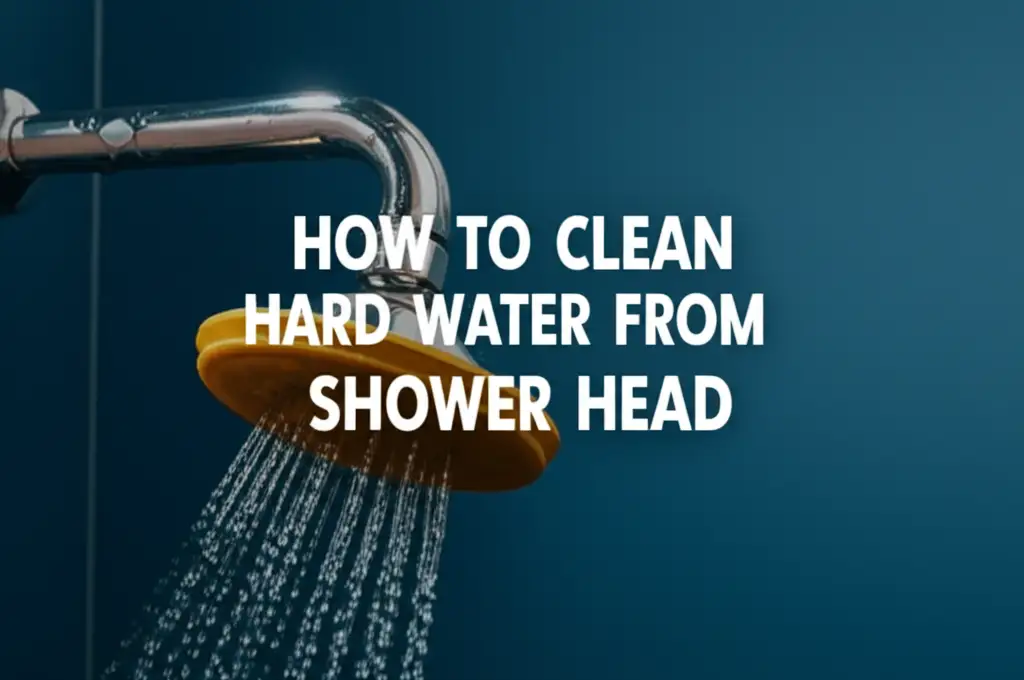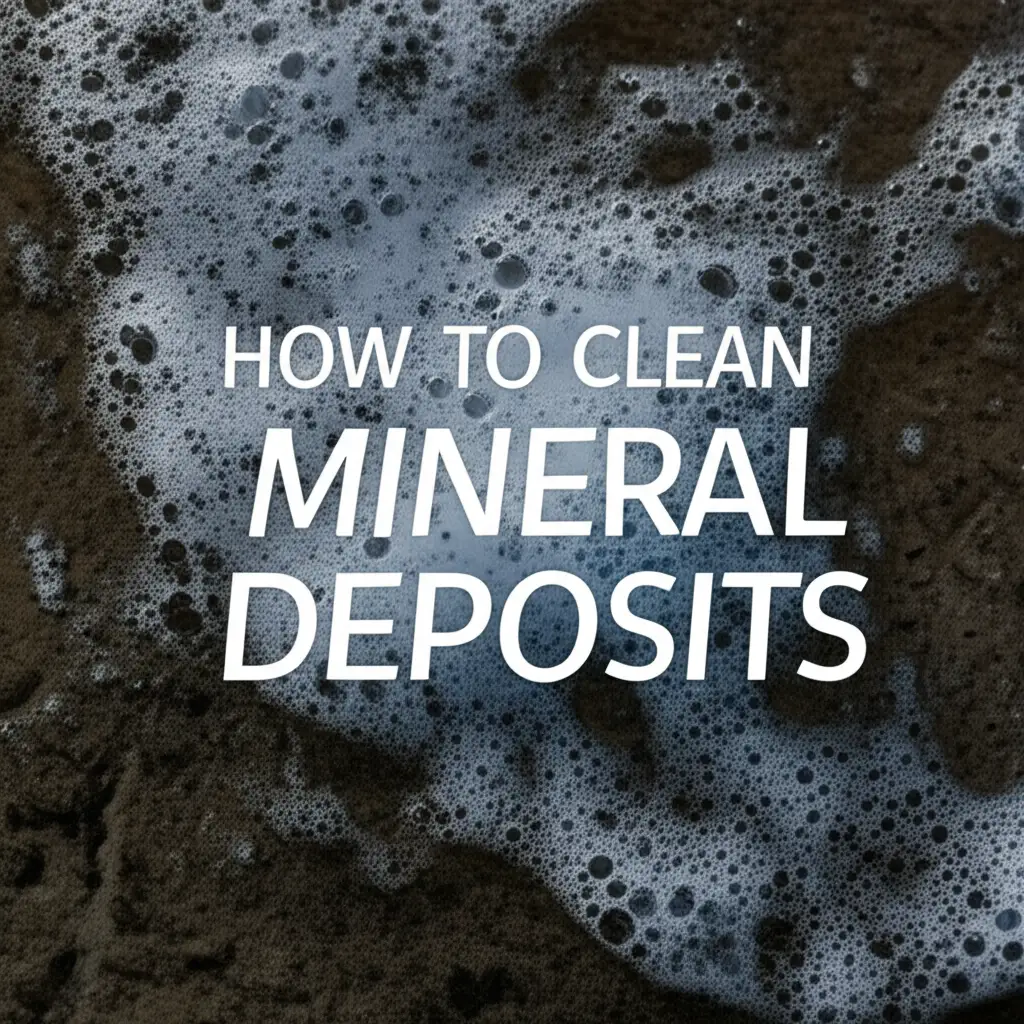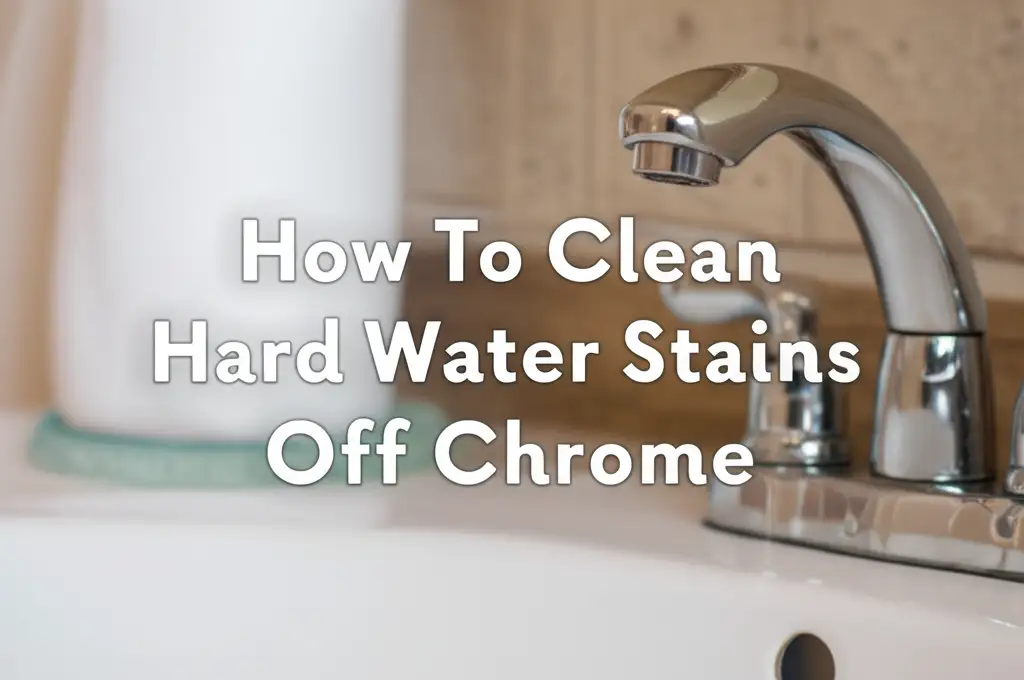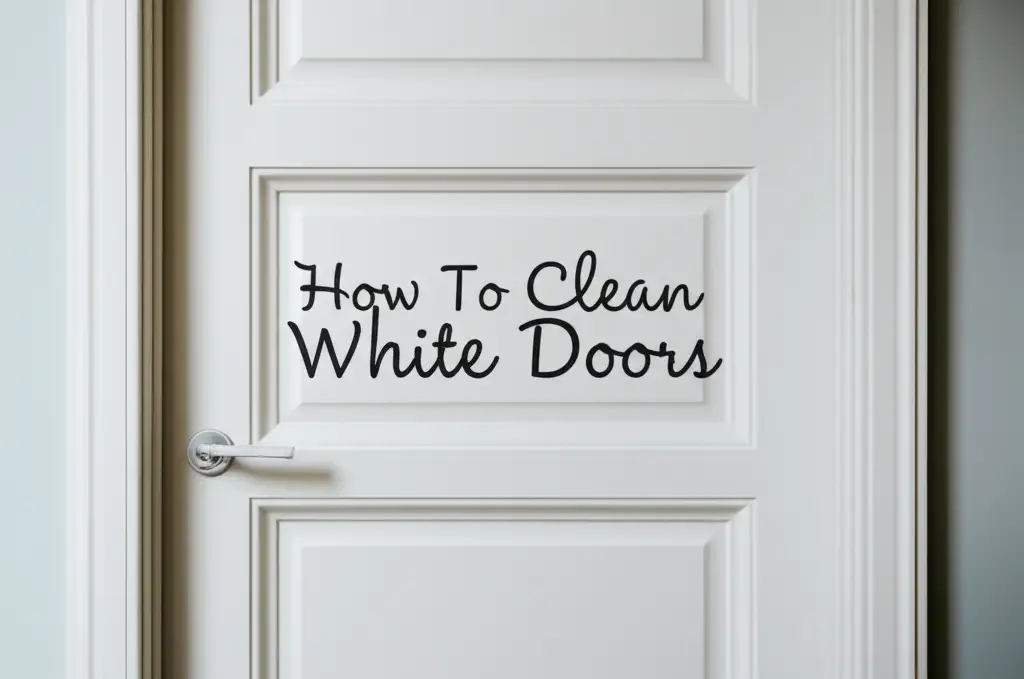· Home Cleaning · 17 min read
How To Clean Hard Water Stain
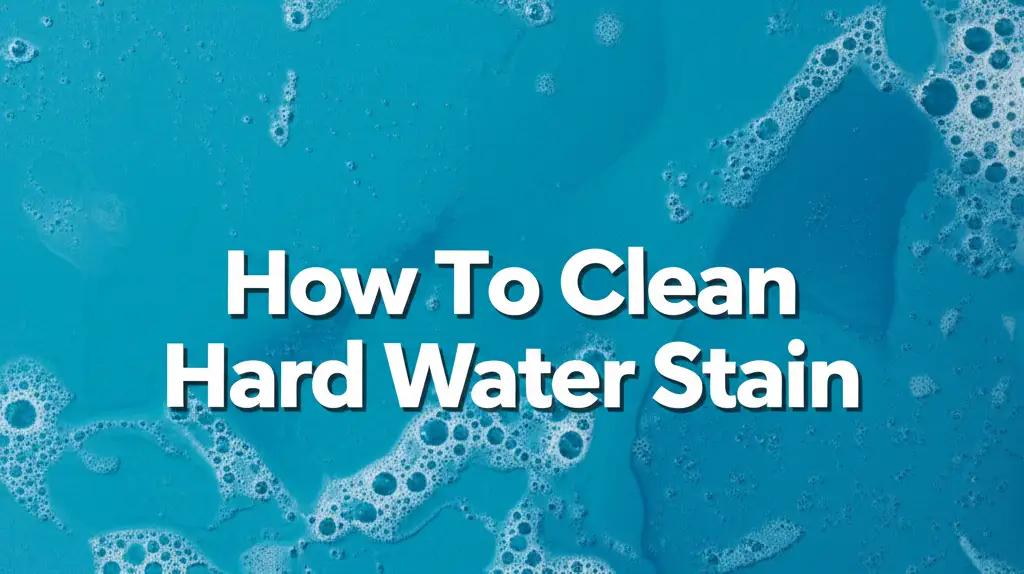
Effortless Ways to Clean Hard Water Stains
Hard water stains can make your home look dull and unkempt. These stubborn mineral deposits appear on almost any surface that comes into contact with water. If you live in an area with hard water, you know the frustration. From cloudy shower doors to spotted faucets, these marks are a constant battle.
Learning how to clean hard water stains effectively saves you time and effort. This guide provides actionable steps and proven methods. We will explore natural remedies, commercial solutions, and preventative measures. You will find practical advice for various surfaces. Get ready to restore the shine to your kitchen and bathroom.
Takeaway
- Identify the type of surface before cleaning.
- Use natural acids like vinegar or lemon juice for mild stains.
- Apply baking soda as a gentle abrasive.
- Consider commercial cleaners for very tough mineral buildup.
- Dry surfaces promptly to prevent new stains.
Hard water stains are mineral deposits left behind when water evaporates. You can clean hard water stains using acidic solutions like white vinegar or lemon juice. Apply the solution, let it sit, then scrub and rinse. For stubborn stains, use a mild abrasive or a specialized cleaner.
Understanding Hard Water Stains: What Are They?
Hard water stains are the chalky residue left behind by evaporating water. This residue primarily consists of calcium and magnesium minerals. Water in many regions contains dissolved minerals. When this water dries, it leaves these minerals behind on surfaces. This creates unsightly spots and films. You see these stains in bathrooms, kitchens, and on outdoor surfaces. They range from white to off-white or even reddish-brown, depending on the mineral content.
These stains are not just an eyesore. Over time, heavy mineral buildup can etch glass. It can also clog showerheads and plumbing fixtures. This can reduce water pressure. It can also shorten the lifespan of appliances. Regular cleaning helps prevent this damage. It also keeps your home looking fresh.
How Hard Water Forms Stains
Water picks up minerals as it travels through soil and rocks. This process makes the water “hard.” The harder the water, the more minerals it contains. When this water lands on a surface and then dries, the water evaporates. The dissolved minerals, however, do not evaporate. They remain on the surface. These minerals bond together. This forms the visible stain.
Common culprits include calcium carbonate, magnesium, and sometimes iron. Iron can leave a reddish or rusty tint. Understanding this process helps you choose the right cleaning method. Acidic cleaners work best because they dissolve these mineral deposits.
Your Go-To Natural Solutions for Hard Water Stains
Natural solutions offer an effective and eco-friendly way to tackle most hard water stains. You likely have these ingredients in your pantry. White vinegar and lemon juice are acidic. They break down mineral deposits easily. Baking soda adds a gentle abrasive quality. These methods are safe for many surfaces. Always test a small, hidden area first.
White Vinegar: The Versatile Cleaner
White vinegar is a cleaning powerhouse for hard water stains. Its acetic acid content dissolves calcium and magnesium. I often grab a bottle of white vinegar for quick clean-ups. It is inexpensive and readily available.
- For Shower Doors and Tiles: Mix equal parts white vinegar and water in a spray bottle. Spray the affected area generously. Let it sit for 15-30 minutes. For tougher stains, use undiluted vinegar. Scrub with a non-abrasive sponge or brush. Rinse thoroughly with clean water. Wipe dry to prevent new stains. If you have particularly challenging hard water stains on shower glass, try extending the soak time or applying a vinegar-soaked cloth.
- For Faucets and Fixtures: Soak a cloth or paper towel in white vinegar. Wrap it around the stained fixture. Secure it with a rubber band. Leave it for a few hours or overnight. Remove the cloth. Scrub away any loosened deposits with an old toothbrush. Rinse and dry. This method works wonders for clearing mineral buildup in the tiny nozzles of a showerhead. You can learn more about how to clean hard water from shower head using vinegar.
- For Windows and Mirrors: Combine equal parts vinegar and distilled water. Spray onto the glass. Wipe with a microfiber cloth. This leaves a streak-free shine. This also helps with hard water off windows.
Lemon Juice: A Citrusy Alternative
Lemon juice contains citric acid. This acid is another excellent mineral dissolver. It also leaves a fresh scent. I find lemon juice particularly pleasant to use. It works similarly to vinegar.
- Application: Apply fresh lemon juice directly to the stain. You can also rub a cut lemon half onto the area. Let it sit for 10-15 minutes. Scrub gently and rinse. This is great for small, localized spots.
Baking Soda: The Gentle Scrubber
Baking soda is a mild abrasive. It helps scrub away softened mineral deposits. You can combine it with vinegar or lemon juice for extra power.
- Creating a Paste: Mix baking soda with a small amount of water or vinegar. Create a thick paste. Apply the paste to the hard water stain. Let it sit for 10-15 minutes. Scrub with a soft brush or sponge. The paste provides gentle friction to lift the residue. Rinse the area thoroughly with water. This combination works well on many surfaces.
Specialized Cleaning for Different Surfaces
Hard water stains appear on various surfaces. Each surface may require a slightly different approach. Using the right method prevents damage. It also ensures effective cleaning. I always consider the material before choosing my cleaner.
Cleaning Shower Glass and Doors
Shower glass often suffers from severe hard water buildup. The constant water exposure makes it prone to heavy staining.
- Vinegar Soak Method: Spray a 50/50 vinegar-water solution onto the glass. Let it soak for 30 minutes to several hours. For extremely tough stains, cover the glass with paper towels soaked in undiluted vinegar. Let it sit overnight.
- Scrubbing and Squeegee: Use a non-scratch scrub pad or a stiff-bristled brush to agitate the loosened minerals. A squeegee is essential for removing all the cleaner and preventing new spots. Always wipe the glass dry after cleaning. This is crucial for preventing future stains. Detailed steps for cleaning shower glass hard water are available.
Restoring Chrome Fixtures
Chrome faucets and showerheads quickly show water spots. Their shiny surface makes stains very obvious.
- Lemon or Vinegar Compress: Soak a microfiber cloth in lemon juice or white vinegar. Wrap it tightly around the chrome fixture. Leave it for 15-30 minutes. The acid dissolves the mineral buildup.
- Gentle Polish: Remove the cloth. Use an old toothbrush or a soft cloth to gently scrub away any remaining residue. Rinse thoroughly. Polish with a dry, clean cloth to restore the shine. Learn more about how to clean hard water stains off chrome. Avoid abrasive pads, as they can scratch chrome.
Cleaning Stainless Steel Sinks and Appliances
Stainless steel looks sleek until hard water spots appear. These spots can be tricky to remove without streaking.
- Vinegar and Oil: Spray white vinegar directly onto the stains. Let it sit for 5-10 minutes. Wipe with the grain of the stainless steel using a microfiber cloth. After rinsing and drying, apply a small amount of olive oil or mineral oil. Buff it in with a clean cloth. This helps prevent new water spots. It also restores the luster. For a comprehensive guide, see how to clean hard water stains from stainless steel sink.
Tackling Stains on Granite and Natural Stone
Granite and other natural stones are porous. They require extra care. Acidic cleaners can etch or damage them.
- Poultice Method: Mix baking soda with a small amount of water to form a thick paste. Add a few drops of mild dish soap. Apply the poultice thickly over the stain. Cover it with plastic wrap. Tape the edges down to prevent drying. Let it sit for 12-24 hours. The poultice draws out the stain.
- Gentle Removal: Scrape off the dried paste with a plastic scraper. Rinse the area with warm water. Dry thoroughly. For stubborn stains, you might need to repeat the process. Always reseal granite after deep cleaning to protect it. For details on how to clean hard water stains from granite without damage, check out specific stone care guides.
When to Use Commercial Cleaners for Tough Stains
Sometimes, natural remedies just do not cut it. Heavily calcified hard water stains may require stronger solutions. Commercial hard water removers contain stronger acids. They can dissolve stubborn mineral buildup more effectively. I turn to these products when I face severe staining.
Always read product labels carefully before use. Different cleaners are designed for different surfaces. Using the wrong product can damage your fixtures. Always ensure adequate ventilation when using these products. Wear protective gloves and eye protection.
Types of Commercial Cleaners
Commercial hard water cleaners come in various forms. Some are sprays, others are gels or foams.
- Acid-Based Cleaners: Many effective commercial cleaners use stronger acids. Examples include phosphoric acid or hydrochloric acid. These are potent. They quickly dissolve limescale and rust. Use them with extreme caution. Never mix them with bleach. This creates toxic fumes.
- Mild Abrasive Cleaners: Some cleaners contain fine abrasives. These help scrub away mineral deposits. They are often cream-based. Use them on durable surfaces like porcelain. Avoid them on delicate surfaces like polished chrome or natural stone. They can cause scratches.
- Enzymatic Cleaners: These are less common for hard water. They break down organic matter. For mineral stains, acid-based cleaners are usually more effective.
Application Tips for Commercial Cleaners
Applying commercial cleaners correctly maximizes their effectiveness. It also ensures safety.
- Ventilation: Open windows and doors. Turn on exhaust fans. Proper airflow is vital.
- Protective Gear: Wear rubber gloves and safety glasses. Protect your skin and eyes from chemical contact.
- Patch Test: Always test the cleaner on a small, inconspicuous area first. This checks for discoloration or damage.
- Application: Apply the cleaner directly to the stained area. Follow the product’s recommended dwell time. This is how long the cleaner needs to sit.
- Scrub and Rinse: Use a non-abrasive sponge or brush to scrub. Work the cleaner into the stain. Rinse thoroughly with plenty of water. Ensure all chemical residue is removed.
- Repeat if Necessary: For very old or thick stains, you might need multiple applications. Do not leave cleaners on surfaces longer than recommended. This can cause damage.
Commercial cleaners are powerful tools. They can restore heavily stained surfaces. Use them wisely and safely.
Tackling Stubborn Stains and Advanced Techniques
Even with strong cleaners, some hard water stains can be incredibly persistent. These often require a bit more elbow grease or specialized tools. I’ve encountered stains that seemed impossible to remove, but with patience and the right technique, they usually yield.
Using Abrasive Tools (with Caution)
For extremely stubborn buildup, a gentle abrasive can help.
- Pumice Stone (for Porcelain): A pumice stone is excellent for toilet bowls and porcelain sinks. Wet both the stone and the surface. Gently rub the pumice stone over the stain. The stone is softer than porcelain. It will wear down before scratching the surface. Always keep it wet. This prevents scratching. It helps lift the mineral scale.
- Razor Blade Scrapers (for Glass): For glass surfaces, like shower doors or windows, a razor blade scraper can be effective. Hold the blade at a shallow angle (about 10-15 degrees) against the glass. Carefully push it to scrape off the softened minerals. This method is very effective for hard water spots. Use extreme caution to avoid scratching the glass or injuring yourself. Never use it on plastic or acrylic.
The Power of Steam Cleaning
Steam cleaners can help loosen hard water deposits. The hot vapor softens the minerals. This makes them easier to wipe away.
- How to Use: Direct the steam nozzle onto the stained area. Let the steam penetrate the buildup for a few seconds. Then, wipe the area with a microfiber cloth. For very tough stains, combine steam with a vinegar solution. Steam makes the minerals more pliable. This improves the effectiveness of acidic cleaners.
The Importance of Repeated Applications
Stubborn stains often need multiple treatments. One application might not be enough to dissolve years of buildup.
- Layering Treatments: Apply your chosen cleaner. Let it sit for the recommended time. Scrub and rinse. If the stain persists, reapply the cleaner. You can even try layering a vinegar-soaked cloth over the stain again. Patience is key. Sometimes, several shorter applications are more effective than one very long one. This reduces the risk of damaging the surface.
Advanced techniques demand attention to detail. Always prioritize safety. Test new methods on an unseen spot first. This protects your surfaces from damage.
Preventing Future Hard Water Stains
Preventing hard water stains is easier than cleaning them. Proactive measures can significantly reduce the frequency and severity of mineral buildup. I always tell people that prevention is the best defense against these unsightly marks.
Squeegee After Every Use
This is perhaps the most effective preventative measure for shower doors and tiles.
- Daily Practice: Keep a squeegee in your shower. After every shower, quickly squeegee down the glass doors and tiled walls. This removes water droplets before they can evaporate and leave minerals behind. It takes less than 30 seconds. This simple habit makes a huge difference.
Wipe Down Surfaces Immediately
Do not let water sit on surfaces. This applies to sinks, countertops, and faucets.
- Quick Dry: After washing hands or dishes, quickly wipe down the sink and faucet with a cloth. Use a separate dry cloth for polishing. This eliminates water spots before they form. A quick wipe is far easier than a deep clean later.
Consider a Water Softener
A whole-house water softener is the ultimate solution for hard water issues. It removes minerals from your water supply.
- How It Works: A water softener uses ion exchange to remove calcium and magnesium. It replaces them with sodium ions. This makes the water “soft.” Soft water does not leave mineral deposits. This prevents stains throughout your home. It also improves soap lathering. It extends the life of appliances. While an upfront investment, it saves time and money on cleaning and repairs in the long run. Regular maintenance, such as understanding how to clean water lines from well or how to clean under sink water filter, can help ensure your water quality is maintained.
Regular Light Cleaning
Even with preventative measures, some mineral buildup might occur. Regular light cleaning keeps it from becoming severe.
- Weekly Wipe-Down: Once a week, quickly spray surfaces with a diluted vinegar solution. Wipe them down. This catches any minor buildup before it becomes a stubborn stain. This proactive approach ensures your surfaces always look their best. It makes cleaning much less of a chore.
Implementing these preventative steps saves you a lot of effort in the long run. Keeping surfaces dry is the most important habit.
Safety Measures for Stain Removal
Cleaning hard water stains involves various chemicals, both natural and commercial. Safety should always be your top priority. Accidents can happen if you are not careful. I always make sure to follow safety guidelines when cleaning. This protects myself and my home.
Ensure Adequate Ventilation
Many cleaning products, even natural ones, can release fumes. These fumes can be irritating or harmful if inhaled.
- Open Windows: Always open windows and doors when cleaning. Use exhaust fans in bathrooms and kitchens. Good airflow disperses fumes. This keeps the air fresh.
- Avoid Confined Spaces: Do not clean in small, poorly ventilated areas for extended periods. Take breaks to get fresh air if needed.
Wear Protective Gear
Protecting your skin and eyes is crucial. Chemicals can cause irritation or burns.
- Gloves: Always wear rubber or nitrile gloves. This protects your hands from direct contact with cleaners.
- Eye Protection: Use safety glasses or goggles. This shields your eyes from splashes and fumes.
- Old Clothes: Wear old clothes that you do not mind getting stained. This protects your regular clothing.
Never Mix Cleaning Chemicals
Mixing certain cleaning products can create dangerous, even deadly, gases. This is a critical safety rule.
- Bleach and Ammonia: Never mix bleach with ammonia-based cleaners. This creates chloramine gas. This gas is highly toxic. It can cause severe respiratory problems.
- Bleach and Acids: Do not mix bleach with acidic cleaners (like vinegar, lemon juice, or many commercial toilet bowl cleaners). This creates chlorine gas. Chlorine gas is also highly toxic.
- One Product at a Time: Use one cleaning product at a time. Rinse the surface thoroughly before applying a different product. This eliminates the risk of accidental mixing.
Test in an Inconspicuous Area
Before applying any cleaner to a large area, always perform a patch test.
- Small Spot: Apply a tiny amount of the cleaner to a hidden part of the surface. Wait a few minutes. Check for discoloration, etching, or damage.
- Protect Your Surfaces: This simple step prevents irreversible damage to your fixtures or countertops. It gives you peace of mind.
Keep Products Out of Reach of Children and Pets
Store all cleaning products safely. This includes natural remedies like vinegar and baking soda.
- Secure Storage: Keep cleaners in their original containers. Store them in high cabinets or locked cupboards. Ensure lids are tightly sealed. This prevents accidental ingestion or exposure.
Following these safety measures protects you and your family. It ensures your cleaning process is effective and safe.
Frequently Asked Questions About Hard Water Stains
Q1: What causes hard water stains?
Hard water stains form when water evaporates and leaves behind dissolved minerals. These minerals are primarily calcium and magnesium. The higher the mineral content in your water, the more noticeable and frequent these stains will be. They often appear as white, chalky deposits. Sometimes they can look rusty if iron is also present in your water.
Q2: Is vinegar safe for all surfaces?
White vinegar is safe for most surfaces, including glass, ceramic, chrome, and stainless steel. However, avoid using vinegar on natural stone surfaces like granite, marble, or travertine. Its acidity can etch or dull these porous materials. Always test vinegar on an inconspicuous spot first.
Q3: How often should I clean hard water stains?
The frequency depends on your water hardness and how quickly stains accumulate. For best results, I recommend wiping down surfaces daily with a squeegee or cloth after use. A weekly light cleaning with a vinegar solution can prevent heavy buildup. For tougher stains, deep clean monthly or as needed.
Q4: Can hard water stains permanently damage surfaces?
Yes, if left untreated, hard water stains can cause permanent damage. The minerals can etch glass surfaces, leaving a cloudy, milky appearance that is very difficult to remove. Heavy buildup can also corrode metal fixtures and clog plumbing. Regular cleaning prevents this long-term damage.
Q5: Do water softeners really prevent stains?
Yes, water softeners are highly effective at preventing hard water stains. They remove minerals like calcium and magnesium from your entire water supply. This eliminates the cause of the stains before they can form. Soft water also improves the efficiency of soaps and detergents. It extends the life of water-using appliances.
Q6: What is the best commercial cleaner for hard water?
The best commercial cleaner depends on the surface and stain severity. Products containing phosphoric acid or hydrochloric acid are highly effective for tough mineral deposits on durable surfaces. For delicate surfaces, look for milder, non-abrasive cleaners specifically designed for hard water removal. Always follow the manufacturer’s instructions and safety warnings.
Conclusion
Cleaning hard water stains might seem like a daunting task. However, with the right knowledge and tools, it is completely manageable. You have learned how these stubborn mineral deposits form. We explored effective natural solutions like vinegar and lemon juice. We also covered when to use stronger commercial cleaners. I always feel a sense of accomplishment after restoring the shine to a water-stained surface.
Remember to tailor your approach to the specific surface you are cleaning. Delicate materials require gentler methods. Hardier surfaces can withstand more robust cleaning agents. Most importantly, prevention is your strongest ally. Adopting simple habits like squeegeeing shower doors and wiping down faucets can drastically reduce future buildup. Implement these tips into your routine. You will enjoy a cleaner, brighter home with fewer hard water stains. Start today and reclaim the sparkle in your home!
- hard water stain
- cleaning tips
- stain removal
- mineral deposits
- limescale

